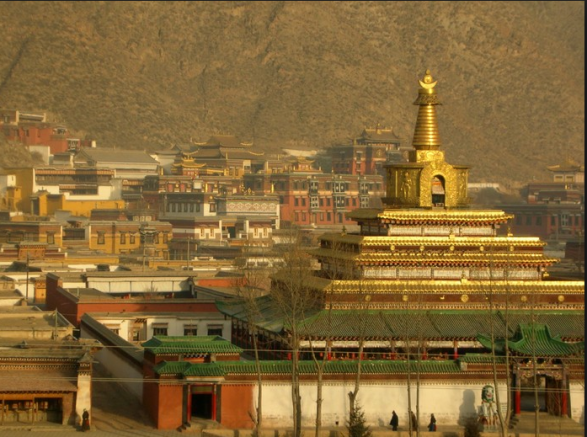Labrang Monastery Of Tibet.

Labrang Monastery was founded in 1709 by Ngagong Tsunde (E’angzongzhe in Chinese), the first-generation Jamyang (a line of reincarnated Rinpoches or living Buddhas ranking third in importance after the Dalai and Panchen lamas), from nearby Gānjiā. The monastery is one of the six major Tibetan monasteries of the Gelugpa order (Yellow Hat sect of Tibetan Buddhism). The others are Ganden, Sera and Drepung monasteries near Lhasa; Tashilhunpo Monastery in Shigatse; and Kumbum (Tǎ’ěr Sì) near Xīníng, Qīnghǎi.At its peak, Labrang housed nearly 4000 monks, but their ranks greatly declined during the Cultural Revolution. Modern Labrang is again such a popular destination for young disciples that numbers are currently capped at 1800 monks, The Labrang Monastery is located at the foot of the Phoenix Mountain northwest of Xiahe County in Gannan Tibetan Nationality Autonomous Prefecture, Gansu Province。
| The architectural layout of the Labrang Monastery belongs to the Tibetan style and the construction patterns are mostly Tibetan and a compound style of Tibetan. The symbols of the whole construction are the White Towers both in the northeast and in the northwest. The grand sutra and Buddha halls are located in the northwestern part centered around the Grand Sutra Hall. Other halls spread in a shape similar to a crescent moon.The Grand Sutra Hall is the dominant place for the religious activities of the Labrang Monastery and for the adherents’ worshipping. On the inside walls there are portraits of Buddha and built-in shrines of Buddha and bookcases. The elegantly decorated hall is splendid enough to give you real enjoyment. |
The best morning views of the monastery come from the Thangka Display Terrace , a popular picnic spot, or the forested hills south of the main town.
Recent Posts
Top 5 Most Asked questions on Tibet Travel
7 Tips for a Successful Trip to Tibet
A Journey to Everest Base Camp in Tibet
All Categories
- About Tibet
- book a Tibet tour
- Buddhism Practice
- Budget Tour
- China-Tibet Train
- Customized Tibet tour
- Historical Sites
- Hot Springs in Tibet
- News
- Photography in Tibet
- Tibet attraction
- Tibet Group Visa
- Tibet Motorcycle Tour
- Tibet Small Group Tours
- Tibet Tours and Tibetan Tour Guide
- Tibet Train
- Tibet Travel FAQs
- Tibet Travel Information
- Tibet Travel News
- Tibet Travel Permit Update
- Tibet Travel Prices Rises
- Tibet Trek
- Tibet Trekking Tour
- Tibet weather and climate
- Tibet Wildlife animals
- Tibet Winter Tour
- Tibetan Buddhism
- Tibetan Cultural Features
- Tibetan Culture and Poeple
- Tibetan Festivals
- What to see in Tibet


